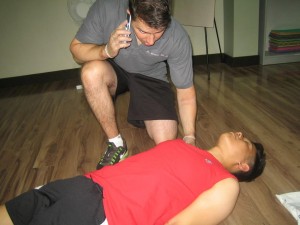A course in ACLS

Advanced Cardiac Life Support (ACLS) is one of our most popular programs offered to healthcare providers. It is a two-day program and runs over several sessions, totaling to 16 hours. It is an advanced program for people who are allowed to medically manage cardiac arrest cases in adults, meaning health care professionals. Since the basics are not the focus of this program, we require that all trainees enroll in the Basic Life Support for HCPs program first, before they can start ACLS training.
Advanced Life Support
ACLS is actually one of two programs that are part of Advanced Life Support training. Out of our five training programs, two are under ALS while three are under Basic Life Support (BLS). Advanced Life Support training is focused on medical management, using the basic CPR skills as a starting point and adding more skills and techniques used in an organized medical response. The other ALS program is for the management of pediatric patients, called Pediatric Advanced Life Support (PALS).
Getting a certificate for Advanced Cardiac Life Support training
Our ACLS program is a certification program. ACLS training certificates have a period of validity of 2 years before they expire. If you want to renew your training certificate, remember to sign up for re-certification before it expires. We do not allow students with expired certificates to sign up for re-certification classes; they have to take the ACLS program again. This is quite a hassle because re-certification classes are quite short, taking only a single five to six hour session, compared to the two-day, 16-hour ACLS training program.
Enrollment
Once you have decided to take our ACLS program, you can sign up through our provider application form. It can be found on the provider homepage and filled out at any time. Likewise, you can also enroll through telephone call, e-mail, or in person. We have providers in six cities all over the country: Los Angeles, San Francisco, Honolulu, Las Vegas, Seattle, and Portland. All of them offer the same programs at the same rates.
Recognizing cardiac arrest
Did you know that four out of five cardiac arrests happen outside the hospital? While almost everyone knows that chest pain is a major sign of an impending or ongoing heart attack (92% according to a survey done by the CDC), only a quarter of respondents were aware of the other major signs and symptoms. Because they don’t know what the other symptoms are, very few people seek medical help when they first feel signs of a possible heart problem. This leads to an increase in the occurrence of heart attacks at home or at work.
Common signs and symptoms
- Chest pain and discomfort
- Pain radiating to the upper chest, shoulder, left arm, chin and nape
- Difficulty breathing
- Easy fatiguability
- Changes in levels of consciousness

I am interested in recerting for the ACLS course in the city of Winnipeg, Manitoba. Can you please provide me with the available dates and locations for the remainder of this year.